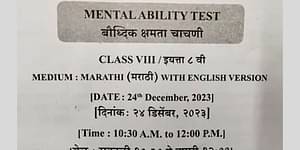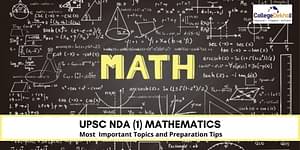M.Ed Admissions 2024
M.Ed Admission Overview
Admissions to M.Ed programs in 2023 are primarily determined through entrance examinations in many universities. Some commonly taken M.Ed entrance exams include CUET PG, IPU CET, and TISSNET among others. The process for DU M.Ed Admission 2023 commenced on July 27, using CUET PG scores, while BHU M Ed admissions 2023 were open until July 31, 2023.
Students aiming to pursue an M. Ed degree at the University of Delhi are required to participate in the CUET PG exam, as DUET 2023 has been discontinued. The CUET PG, administered by the NTA, took place from June 5 to 10, 2023. Additionally, individuals interested in a Distance M.Ed course can explore options at IGNOU, where MEd admissions for the July session were open until June 30, 2023.
To be eligible for M.Ed Admission in 2023, candidates typically need a minimum of 50% to 60% marks from a university recognized by the UGC. Those who have completed a bachelor's degree in Arts with education as a subject (BA Ed) also meet the eligibility criteria for M. Ed Admission. Most M.Ed colleges conduct their own entrance examinations, and applicants must ensure they submit their application forms within the specified deadlines.
Table of Contents
M.Ed Admission Highlights
Here are the important cardinal aspects related to M.Ed (Master of Education) admissions in India presented in a table format:
Aspect | Description |
|---|---|
| Eligibility Criteria | Typically, a Bachelor's in Education (B.Ed) degree is required. Some universities may also consider a B.A/B.Sc. with a focus on education. |
| Entrance Exams | Common entrance exams like CUET PG, AMUEEE, or state-specific exams are conducted by universities for admissions. |
| Application Process | Usually online applications through the university's website. Application forms, documents, and fees need to be submitted within specified deadlines. |
| Admission Tests | Candidates must appear for the M.Ed entrance test and achieve a minimum qualifying score. |
| Merit-Based Admissions | Some universities offer admissions based on the candidate's performance in their undergraduate program and other relevant criteria. |
| Reservation Quotas | Seats are reserved for specific categories such as SC/ ST/ OBC/ PwD as per government regulations. |
| Counseling | Qualified candidates are called for counseling, where they can choose their preferred college and specialization. |
| Document Verification | Original documents like mark sheets, certificates, and ID proof are verified during counseling. |
| Seat Allotment | Based on merit or rank, candidates are allocated seats in M.Ed programs and colleges. |
| Fee Structure | Tuition fees vary by institution and category of admission (government quota or management quota). |
| Scholarships | Some universities and government schemes offer scholarships to eligible M.Ed students. |
| Admission Deadlines | Application deadlines, entrance exam dates, and counseling schedules are crucial to track. |
| Specializations | M.Ed programs offer various specializations like Educational Psychology, Curriculum and Instruction, and Administration. |
| Duration | M.Ed programs typically last for 2 years, divided into 4 semesters. |
| Accreditation | Check if the institution and program are recognized and accredited by relevant education bodies. |
| Placement Opportunities | Investigate the placement record and opportunities offered by the institution. |
| Research Opportunities | Consider if the institution supports research activities and opportunities in the field of education. |
Please note that specific details may vary among institutions and over time, so it's important to verify the latest admission guidelines from the respective universities or educational authorities.
M.Ed Eligibility
The eligibility criteria for M.Ed (Master of Education) programs in India typically include the following:
Educational Qualification: Candidates should have a Bachelor's degree in Education (B.Ed) from a recognized university or institution. Some universities may also accept candidates with a BA/ B.Sc degree in a related field with a focus on education.
Minimum Percentage: Many universities require candidates to have a minimum percentage in their qualifying examination. This percentage requirement can vary from one institution to another but is often in the range of 50% to 55%.
Entrance Exam: Some universities and colleges conduct entrance examinations for M.Ed admissions. Candidates are required to appear for these exams, and their performance in the entrance test is an important criterion for selection.
Merit-Based Admissions: In addition to entrance exams, some institutions may also offer merit-based admissions. They consider the candidate's academic performance in their undergraduate program and sometimes take into account relevant work experience.
Reservation Quotas: Reserved seats are available for candidates from specific categories such as Scheduled Castes (SC), Scheduled Tribes (ST), Other Backward Classes (OBC), and Persons with Disabilities (PwD) as per government regulations. Candidates belonging to these categories may have relaxation in the eligibility criteria.
Citizenship: Candidates must be Indian citizens to be eligible for M.Ed admissions in Indian universities.
Age Limit: There is typically no specific age limit for M.Ed admissions, but candidates should verify the age-related requirements from the respective institutions.
Additional Requirements: Some universities may have additional requirements such as a teaching certificate or experience in the education field. These requirements can vary, so it's essential to check the specific criteria of the university you are interested in.
Please note that eligibility criteria may vary among universities and may change from year to year, so it's crucial to check the official admission notifications and guidelines provided by the universities or educational authorities for the most up-to-date information.
M.Ed Fees
The fees for M.Ed (Master of Education) programs in India can vary significantly depending on the institution, its location, and whether it's a government-funded or private institution. Here's a general idea of the fee structure for M. Ed programs:
Government Institutions: MEd programs in government institutions are often more affordable compared to private colleges. The annual tuition fees in government colleges can range from approximately Rs. 10,000 to Rs 50,000 or even less, depending on the state and university.
Private Institutions: Private colleges tend to have higher tuition fees for M Ed programs. The annual fees in private colleges can range from Rs. 50,000 to Rs. 2,00,000 or more.
Management Quota: Some private colleges offer a management quota, where students can secure admission by paying a higher fee. The fees under management quota can be considerably higher than the regular fees.
Scholarships: Many universities and government schemes offer scholarships to eligible M. Ed students. These scholarships can significantly reduce the financial burden on students.
Additional Costs: Apart from tuition fees, students should also consider additional costs such as registration fees, examination fees, library fees, and other miscellaneous charges. Hostel and living expenses, if applicable, are additional costs.
Fee Waivers: In some cases, universities may offer fee waivers or concessions to economically disadvantaged or meritorious students.
It's essential to note that these figures are approximate and can change over time. The exact fee structure for a particular M Ed program can be obtained by contacting the specific university or college where you intend to apply. Additionally, it's a good idea to inquire about any available scholarships or financial aid options to help offset the cost of education.
M.Ed Specializations
M. Ed (Master of Education) programs in India offer various specializations to cater to different interests and career goals in the field of education. Here are some common specializations available in M. Ed programs:
Educational Psychology: This specialization focuses on the study of human learning, development, and behavior in educational settings. It explores the psychological aspects of teaching and learning and how they influence educational practices.
Curriculum and Instruction: In this specialization, students delve into curriculum design, development, and evaluation. They learn how to create effective teaching materials and strategies to enhance the learning experience.
Educational Administration and Leadership: This specialization prepares students for leadership roles in educational institutions. It covers topics like school management, policy development, and organizational leadership.
Teacher Education: Teacher education programs aim to train educators who can effectively teach and mentor future teachers. This specialization focuses on pedagogy, curriculum development, and teacher training methodologies.
Special Education: Special education specialists work with students with disabilities, addressing their unique learning needs. This specialization covers strategies for inclusive education and individualized support.
Counseling and Guidance: This specialization is geared towards individuals interested in becoming educational counselors. It involves the study of counseling techniques and strategies for helping students with academic and personal challenges.
Adult Education: Adult education specialists work with adult learners in various settings, such as vocational training, community colleges, and adult literacy programs. This specialization explores the unique needs of adult learners.
Distance Education: With the growth of online learning, this specialization focuses on designing, delivering, and managing distance education programs and e-learning platforms.
Environmental Education: This specialization emphasizes environmental sustainability and education. It prepares educators to integrate environmental issues into their teaching and promote environmental awareness.
Early Childhood Education: Specializing in early childhood education involves understanding the developmental needs of young children and designing age-appropriate curricula and teaching methods.
Comparative Education: Comparative education specialists analyze educational systems and practices from different countries to gain insights into global education trends and best practices.
Language Education: This specialization focuses on language acquisition, teaching, and linguistics. It's suitable for those interested in language teaching or literacy development.
These are just a few examples, and the availability of specializations can vary from one university to another. When considering an M.Ed program, it's essential to explore the specializations offered by different institutions and choose the one that aligns with your career goals and interests.
M.Ed Entrance Exams
To gain admission to M.Ed (Master of Education) programs in India, candidates often need to clear entrance exams conducted by universities and educational institutions. These tests evaluate a candidate's knowledge, skill level, and programme appropriateness. Here are some common M.Ed entrance exams in India:
M. Ed CET (Common Entrance Test): Some states and universities conduct their own M.Ed CET for admission to M.Ed programs. For example, Maharashtra MEd CET is conducted for M.Ed admissions in Maharashtra.
CUET PG (Central Universities Common Entrance Test): CUET is a national-level entrance exam accepted by several central universities and state institutions offering M.Ed programs.
DU M.Ed Entrance Exam: The University of Delhi conducts its own entrance exam for M. Ed admissions in its affiliated colleges.
Jamia Millia Islamia M. Ed Entrance Exam: Jamia Millia Islamia University conducts a separate entrance exam for its M.Ed program.
IGNOU OPENMAT: Indira Gandhi National Open University (IGNOU) conducts the OPENMAT exam, which is used for admission to various distance education programs, including M.Ed.
State-Level Exams: Many states have their own MEd entrance exams, such as AP EDCET (Andhra Pradesh Education Common Entrance Test), TS EDCET (Telangana State Education Common Entrance Test), etc.
University-Specific Exams: Some universities and colleges may have their unique entrance exams for M. Ed admissions. Candidates should check the admission criteria of the specific institution they are interested in.
Pondicherry University M.Ed Entrance Exam: Pondicherry University conducts an entrance exam for its M. Ed program.
Please note that the availability and specific entrance exams can vary from year to year and from one institution to another. It's crucial for candidates to check the official websites of the universities or institutions where they plan to apply for the most up-to-date information on MEd entrance exams, including exam dates, syllabus, and application procedures.
M.Ed Entrance Exams Schedule
A few of the top M.Ed entrance exams conducted in India are as follows:
Entrance Exam | Registration Date | Exam Date |
|---|---|---|
| JUET | Last week of August 2023 (tentative) | September 2023 (tentative) |
| CUET PG | March 20 – May 05, 2023 | June 05 – 12, 2023 |
| TISSNET | December 14 - February 01, 2023 | January 28 - February 28, 2023 |
| AMUEEE | February 17, 2023 - March 24, 2023 | May 14, 2023 |
| IPU CET | March 24 – May 22, 2023 | May 30 – June 15, 2023 |
M.Ed Entrance Exams Syllabus
The syllabus for M.Ed (Master of Education) entrance exams in India may vary slightly from one university to another, but there are common topics and subjects that are typically covered. Below is a general overview of the common subjects and topics that you can expect to find in M. Ed entrance exam syllabi:
Subject/ Area | Topics Covered |
|---|---|
| Educational Psychology | - Theories of learning and motivation |
| - Human development and personality theories | |
| - Intelligence and creativity | |
| - Educational measurement and assessment | |
| - Educational counseling and guidance | |
| Teaching Aptitude | - Teaching as a profession |
| - Teaching-learning process | |
| - Classroom management | |
| - Curriculum development and evaluation | |
| - Educational technology | |
| General Knowledge | - Current affairs |
| - History of education in India | |
| - Educational policies and reforms in India | |
| - Indian Constitution and educational provisions | |
| Research Aptitude | - Research methodology |
| - Research ethics and types of research | |
| - Data analysis and interpretation | |
| Subject-Specific Topics | - Topics related to the chosen specialization, such as curriculum and instruction, educational administration, special education, etc. |
| Language Proficiency | - Proficiency in English and/or a regional language, depending on the exam's medium. |
| Numerical Ability | - Basic numerical skills and problem-solving abilities. |
| Reasoning Ability | - Logical and analytical reasoning skills. |
Please remember that the specific syllabus can vary based on the university or institution conducting the M.Ed entrance exam. It's crucial to refer to the official notification or website of the respective exam for precise details on the syllabus.
M.Ed Selection Process
The selection process for M. Ed (Master of Education) programs in India typically involves several stages and criteria to assess the suitability of candidates for admission. Here is a general overview of the MEd admission process at various colleges and universities:
Entrance Exam: Many universities and institutions conduct entrance exams specifically designed for MEd admissions. Candidates are required to appear for these exams, which assess their knowledge, aptitude, and subject-specific skills. The performance in the entrance exam plays a significant role in the selection process.
Merit-Based Selection: Some colleges also provide merit-based selection in addition to entrance tests. This means that a certain percentage of seats may be allotted to candidates based on their academic performance in their undergraduate program, such as B.Ed or a related degree. Universities may consider the candidate's marks or grade point average (GPA) for this purpose.
Counseling and Interview: After the entrance exam and/or merit-based selection, candidates are typically called for counseling sessions. During counseling, candidates can choose their preferred college, specialization, and seats based on their ranks or merit. In some cases, universities may conduct interviews as part of the selection process to assess a candidate's suitability for the program.
Document Verification: During the counseling process, candidates are required to provide original documents like mark sheets, certificates, identity proof, and proof of category (if applicable). These documents are verified to ensure that the candidate meets the eligibility criteria.
Seat Allotment: Based on the candidate's performance in the entrance exam, merit-based criteria, and choices made during counseling, seats are allotted to candidates in M. Ed programs and colleges. The allocation is typically done based on the candidate's rank or merit.
Payment of Fees: Once candidates are allotted seats, they are required to pay the prescribed fees for the M.Ed program. This includes tuition fees, registration fees, and other charges.
Waitlist: In case some seats remain vacant after the initial round of admissions, a waitlist of candidates may be maintained. These candidates can be offered admission if any seats become available due to withdrawals or cancellations.
Reservations: Seats are often reserved for candidates belonging to specific categories such as Scheduled Castes (SC), Scheduled Tribes (ST), Other Backward Classes (OBC), and Persons with Disabilities (PwD) as per government regulations. Reservation quotas may vary by institution and state.
It's important to note that the exact selection process can vary among universities and institutions. Candidates should carefully review the admission notifications and guidelines provided by the specific university or college where they intend to apply to understand the selection criteria and process specific to that institution.
How to Apply for a M.Ed course?
To apply for M. Ed courses in India, follow these steps:
Research: First, research various universities and colleges offering MEd courses in India. Check their eligibility criteria, course details, and admission process.
Check Eligibility: Ensure you meet the eligibility criteria, which usually require a Bachelor's degree in Education (B.Ed) with a minimum aggregate score of 50-55% (varies among institutions).
Entrance Exams: Some institutions conduct entrance exams for M.Ed courses. Popular exams include CUET PG (Common University Entrance Test), and GGSIPU CET (Guru Gobind Singh Indraprastha University Common Entrance Test), etc. Register for the relevant exams.
Online Application: Visit the official website of the institution you wish to apply to and fill out the online application form. Provide accurate details about your personal information, educational background, and other required information.
Upload Documents: Scan and upload necessary documents, including academic certificates, marksheets, photo ID, passport-sized photograph, and signature as per the specified format.
Pay Application Fee: Pay the application fee online through net banking, debit/credit card, or other available options. A copy of the payment receipt should be kept for future use.
Merit-Based Admission: For merit-based admissions, universities will release a merit list based on your academic scores. Check the institution's website for updates on the merit list release date.
Counseling Process: If your name appears on the merit list, you may need to participate in the counseling process. This involves selecting your preferred college and course from the available options.
Document Verification: During counseling, you'll need to verify your original documents and submit them for verification. Ensure you carry all necessary documents along with photocopies.
Admission Confirmation: After document verification, pay the admission fee to confirm your seat. Complete the required paperwork and formalities.
Waitlist Process: If any seats remain vacant after the initial round of admissions, the institution might release a waitlist. If you're on the waitlist, monitor the institution's website for updates.
Commencement of Classes: Once admitted, attend the commencement of classes as per the schedule provided by the institution.
Note: Different institutions might have slightly varying admission procedures, so make sure to read the admission brochure carefully and follow their instructions.
Documents Required for M.Ed Course Admissions
When applying for M.Ed course admissions in India, you will generally need to provide a set of documents for the application process. While specific document requirements may vary from one institution to another, here is a list of commonly required documents:
Application Form: A filled-out application form, available on the respective university or college's official website.
Academic Certificates: Provide your academic certificates as proof of your educational qualifications. This typically includes:
Bachelor's degree certificate (B.Ed or equivalent)
Higher secondary (10+2) certificate
Secondary (10th) certificate
Marksheets: Copies of your marksheets for all qualifying examinations, including:
Bachelor's degree marksheets
Higher secondary marksheets
Secondary marksheets
Entrance Exam Scorecard: If the institution conducts an entrance exam for M.Ed admissions, provide a copy of your scorecard or rank card.
Photo ID Proof: A government-issued photo identification proof, such as:
Aadhar card
Passport
Voter ID
Driving license
Passport-size Photographs: Recent passport-sized color photographs as per the institution's specifications.
Signature: A scanned or photocopied copy of your signature as per the required format.
Category Certificate (if applicable): If you belong to a reserved category (SC/ ST/ OBC/ PwD), provide a valid category certificate issued by the competent authority.
Transfer Certificate (TC): A TC issued by the last institution you attended, indicating that you have completed the previous course and are eligible for admission to the M.Ed program.
Migration Certificate: If you are transferring from a university outside your state, you may need to provide a migration certificate.
Character Certificate: A character certificate issued by a recognized authority to confirm your good conduct.
Income Certificate (if applicable): For candidates applying for fee concessions or scholarships, an income certificate may be required.
Residence Proof: Proof of your residential address, such as a utility bill, rental agreement, or any other relevant document.
Caste Certificate (if applicable): For candidates belonging to scheduled castes (SC), scheduled tribes (ST), or other backward classes (OBC), a valid caste certificate is required.
Other Relevant Documents: Any additional documents specified by the institution in their admission notification, such as proof of disability (if applicable) or domicile certificate.
It's important to note that the specific document requirements may vary from one university or college to another, so it's advisable to check the institution's official website or admission brochure for precise information on the documents they require for M. Ed course admissions. Ensure that all documents are submitted in the prescribed format and within the specified deadlines to avoid any complications during the admission process.
FAQs about Master of Education Admission Process
What is the total time offered to complete M.Ed?
The total duration of the M.Ed course is 2 years, divided into four semesters.
Can I get admission in M.Ed after 12th?
No, you cannot get admission in M. Ed (Master of Education) directly after 12th. M.Ed programs in India typically require a Bachelor's degree in Education (B.Ed) or a related field as the minimum eligibility criteria. A 12th-grade qualification is insufficient for M.Ed admission; you must first complete a relevant undergraduate degree.
Which specialization is best for M.Ed?
The choice of specialization for M. Ed depends on individual career goals and interests. Some popular MEd specializations include Educational Leadership and Administration, Curriculum and Instruction, Special Education, and Guidance and Counseling.
Is M.Ed better than B Ed?
M Ed (Master of Education) is considered a higher and more specialized degree compared to B.Ed (Bachelor of Education). While B.Ed is an undergraduate program that provides basic teaching skills, M.Ed offers advanced knowledge and expertise in educational theory and practice, making it a better choice for those seeking career growth and leadership roles in the field of education.
Can I do M.Ed without doing B Ed?
Typically, a Bachelor's in Education (B. Ed) is a prerequisite for pursuing a Master's in Education (M Ed) in India. However, some universities may offer integrated programs that allow you to pursue M.Ed without a separate B.Ed degree. Admission criteria may vary, so it's advisable to check with specific institutions offering such programs.
Are entrance exams required for M.Ed admissions?
Entrance exams for M Ed admissions vary by university and college in India. Some institutions do require candidates to appear for entrance exams, while others offer admissions based on merit, considering the candidate's B. Ed aggregate score. It is advisable to check the admission guidelines of the specific institution you are interested in to determine whether an entrance exam is required.
Can I pursue M.Ed without prior teaching experience?
Yes, in India, you can pursue a Master's in Education (M. Ed) without prior teaching experience. While some institutions may value teaching experience as an asset during admissions, it is not a mandatory requirement for M.Ed eligibility. Admission criteria typically focus on your educational qualifications, such as holding a B.Ed degree with specified academic criteria.
Can I apply for M.Ed from a different state than where I completed my B.Ed?
Yes, you can apply for M. Ed in a different state than where you completed your B.Ed. However, some universities may require you to provide a migration certificate to confirm your eligibility for admission in a different state. Be sure to check the specific admission requirements of the institution you wish to apply to.
Can I pursue M.Ed as a distance education program in India?
Yes, you can pursue M.Ed as a distance education program in India. Several universities and institutions offer M Ed courses through distance learning mode. These programs provide flexibility for working professionals and individuals who cannot attend regular classes but still wish to enhance their qualifications in the field of education.
Are there any age limitations for M.Ed admissions?
Typically, there are no age restrictions for M. Ed admissions. Candidates of any age may apply as long as they meet the requirements.
Popular Courses
M.Ed Colleges in States
M.Ed Colleges in Cities
M.Ed Colleges by College Type
- Courses
- Master of Education
- Admission Process


















